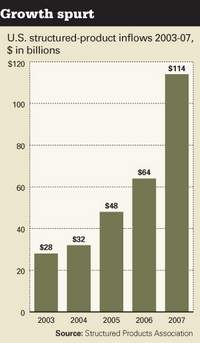Investment is FDIC-insured up to $100KBy
Jeff BenjaminInvestment News
The structured-products industry, which has proved to be uniquely vulnerable to recent Wall Street meltdowns, is expected to promote increased shelter and regain some momentum by wrapping certificates of deposit around debt instruments.
"We'll likely see an increase in CD wrappers around structured products going forward," said Mark Kolodzinski, director of structured products at Bonds.com Inc. in Boca Raton, Fla.
Lehman Brothers Holdings Inc.'s filing for bankruptcy protection this month was a "game-changing event," he said.
"Lehman failed the first stress test on principal-protection products," Mr. Kolomynski added. "People will be paying a lot more attention to the credit quality of the issuing firms from now on."
While New York-based Lehman's problems are still a long way from being settled, the idea of an issuing firm going belly up ranks among the worst-case scenarios for structured-product investors.
"[Expect to see] a massive paradigm shift toward CD wrappers," said Keith Styrcula, chairman of the Structured Products Association in New York. "The dealers are already shifting toward CD wrappers as a market reaction."
CREDITWORTHINESSAs debt instruments that use derivatives to achieve various investment objectives, structured products are dependent on the creditworthiness of the issuing firms. In the event of a default, as is potentially the case with Lehman, holders of structured products fall in line along with all other creditors.
But by placing certain structured-product strategies inside CDs, the investment is insured like any other bank deposit for up to $100,000 by the Federal Deposit Insurance Corp. in Washington.
For example, a CD could be wrapped around a structured product that offered upside of an equity index such as the Dow Jones Industrial Average.
As with plain-vanilla CDs, the investment returns are determined by the terms of the agreement. The performance of the underlying structured product is affected to reflect the FDIC insurance feature.
Unlike an ordinary CD, which will lock in a designated rate of return for a specific term, the structured-product feature includes the risk of zero return beyond the guarantee of principal.
FDIC-INSUREDThe initial investment of up to $100,000 is guaranteed by the FDIC, but the performance of the underlying structured product is dependent on the market.
For instance, a six-year note inside a CD might offer an investor a 10% return depending on the performance of the index. In the event that the index underperforms, the investor receives just his or her principal.
Compare that with a non-CD structured product, where a principal-protection guarantee is tied to the strength of the issuing company's balance sheet.
"I would never say a CD wrapper is the end-all, but they are very attractive for investors that need market exposure but are concerned about the risks," said Brad Livingston, vice president at Advisors Asset Management Inc., a Boerne, Texas-based platform that distributes structured products to brokers and advisers.
The CD wrappers were first introduced to the U.S. market a few years ago by European banks looking for access to the structured-product market.
Since CDs are exempt from U.S. securities laws, some foreign banks found that opening a commercial-bank branch here was the easiest means of selling structured products in the U.S. market, Mr. Styrcula said.
Prior to the CD wrapper, there was even a short-lived effort by some firms to wrap structured products with private insurance as a way to guarantee principal, according to Mr. Kolodzinski.
These days, virtually every commercial bank is equipped to offer CD wrappers around structured products.
Meanwhile, as the structured-product industry enjoyed a couple of years of explosive growth, the CD wrapper lost some of its appeal — until recently.
"I've been gravitating toward the strongest names and looking at CD-backed products, but I made that decision before the latest disaster," said Frederick Wright, chief investment officer at Smith & Howard Wealth Management LLC, an Atlanta-based firm with $225 million under advisement.
The structured-product industry enjoyed record sales of $114 billion last year, reflecting a 78% increase over 2006 and a 300% increase over 2003.
The financial crisis has already derailed much of the industry's momentum, but as the dust settles, the hope is that the CD wrapper will gain appeal among financial advisers and brokers — the primary distribution channel for structured products.
"Right now, we're seeing a lot of paralysis, period," Mr. Livingston said. "But banks issue CDs because they need money, and we're hoping there will be enough banks to issue enough CDs."
For the original story in
Investment News, click here.


